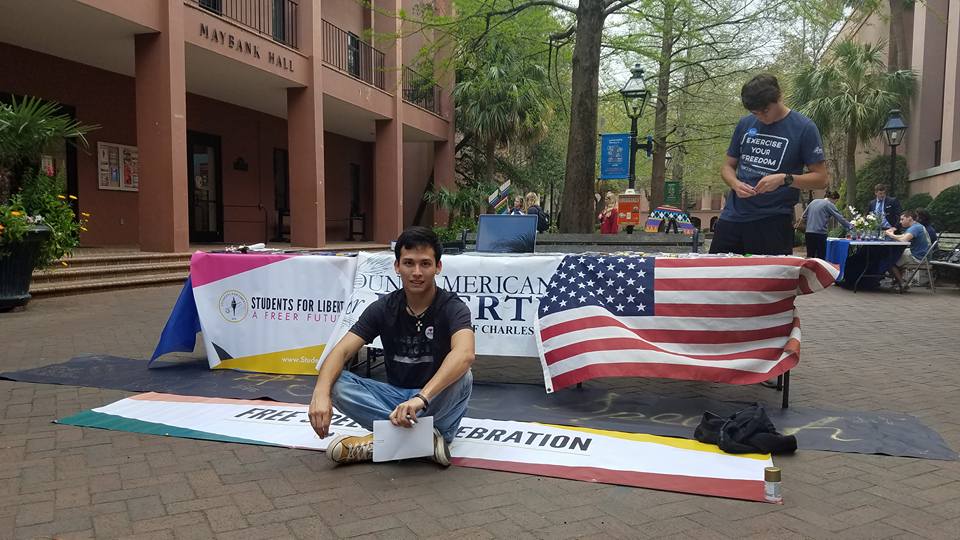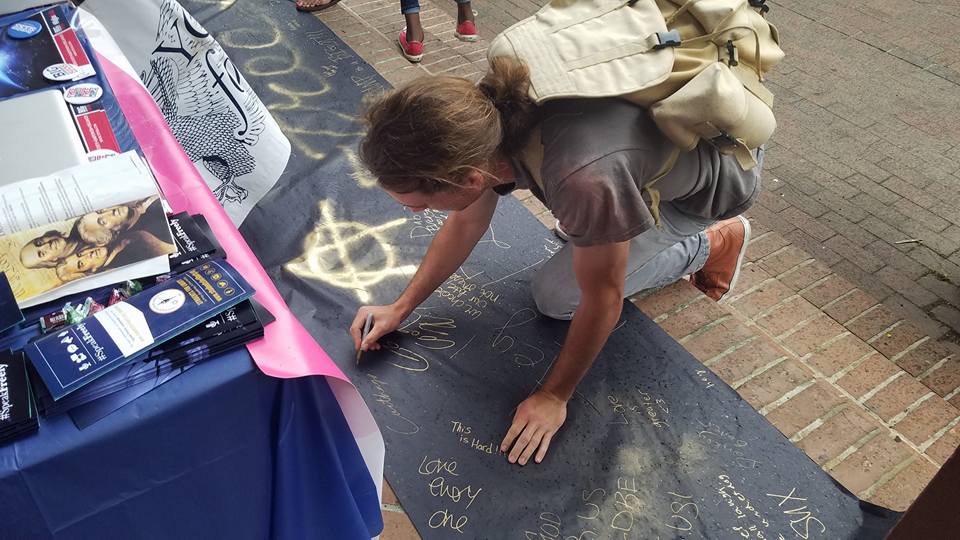Students Challenge Restrictive Speech Codes in Charleston
Students across the United States work tirelessly to promote the importance of free speech, and they often achieve important victories. For example, a student from Blinn College was told by administrators that she needed “special permission” to display gun rights signs. FIRE (Foundation for Individual Rights in Education) undertook the student’s case, sued the school, and won! This instance shows that students can successfully fight for free speech and make a difference, and College of Charleston students are doing just that.
Students for Reason, Individualism, Value Pursuit, and Enterprise (STRIVE) and Young Americans for Liberty (YAL) at College of Charleston have spearheaded several initiatives – with the help of Students for Liberty’s Speak Freely Grant – to reform their speech codes. The clubs’ efforts have gained over 100 petition signatures. They have convinced the student body and college administrators that free speech is absolutely essential for students’ intellectual growth. In light of this, Dr. Jeri O. Cabot (the Dean of Students at the College) and three graduate students are now revising the school’s Student Code of Conduct, to better reflect the First Amendment. If all goes well, the College of Charleston will enjoy speech codes that fully embrace students’ right to free speech and expression by the next academic school year.

Nick Simons, a member of YAL, and Coleman Theodore, an executive board member of YAL, STRIVE, and Turning Point, hosted the Free Speech Banner event at College of Charleston.
Under the First Amendment of the US Constitution, all public institutions, including the College of Charleston, are legally bounded to recognize that the “Congress shall make no law […] abridging the freedom of speech, or of the press.” Regardless of how controversial and uncommon those opinions are, schools must not prohibit students from engaging in the free exchange of ideas. Institutions of higher learning provide students with the opportunity to learn and have their ideas challenged; their right to free speech does not end when they set foot on campus. We cannot allow our rights to be dismantled. What is the point of going to college if we are paying for four years of education in which we are coddled by administrators and denied the ability to freely express ourselves?
Unfortunately, the College’s verbal abuse policy would have received a “red light” based on a policy review by FIRE: a non-profit organization that protects students’ individual rights on campus. The current policy prohibits “verbal abuse, defined as use of derogatory terms, foul or demeaning language, which may be accompanied by a hostile tone or intense volume of delivery.” We need to keep in mind that what is offensive to one person may not be to another, even if a comment is made with a “hostile tone or intense volume of delivery.” Statements considered to be offensive are generally protected by the First Amendment.
It was just last year on November 15th that Glenn F. McConnell, the President of the College of Charleston, emailed students stating that “it is our duty as Americans and members of the College of Charleston to treat each other with kindness and empathy. No matter the political divide, we must always be tolerant of each other’s views.” He deserves praise for recognizing the importance of tolerating others’ viewpoints, but he added, “Hateful speech and actions will not be tolerated at the College.” The problem here lies in the phrase “hateful speech.” This term is so broad and vague that it can mean very different things to different people.
We must not repeat the mistakes of other universities. Consider a recent incident at Emory University when someone wrote “Trump 2016” on campus sidewalks. Students were so offended by the chalk message that they reported the incident to school administrators. Jim Wagner, the President of Emory University, said that students “voiced their genuine concern and pain in the face of this perceived intimidation.” It is unfortunate that people’s freedom to express their political opinions is under threat because it is interpreted by students and administrators as “perceived intimidation.”
Fortunately, College of Charleston is steering away from anti-speech rhetoric and is on its way to becoming an institution that values diversity in thoughts and ideas. According to Dr. Cabot, the latest draft of the college’s revised speech codes “does delete verbal abuse.” This is a massive improvement, which moves the College away from the aforementioned “red light” categorization. Students are likely to see a new Student Code of Conduct that is in line with the First Amendment by the beginning of the next academic school year. Until then, STRIVE and YAL will continue their grassroots efforts to educate students and faculty members about the importance of free speech and expression, so that administrators will not lose sight of it.
Natalie Bao Tram Le is a Young Voices Advocate and a College of Charleston alumna.

